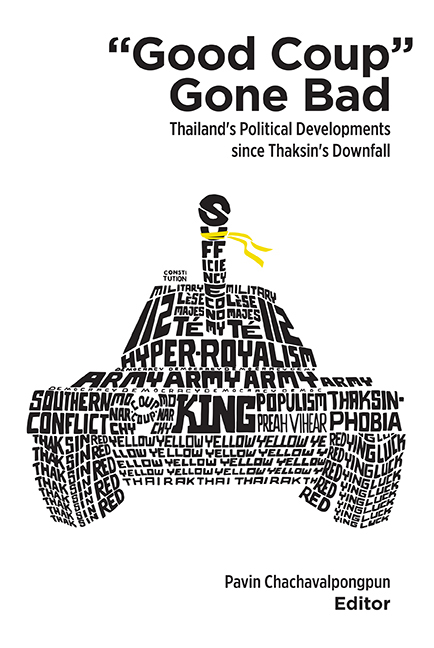Book contents
- Frontmatter
- Contents
- List of Tables and Figures
- Foreword
- Contributors
- Abbreviations
- Section I The 2006 Military Coup: Impact on the Thai Political Landscape
- Section II Defending the Old Political Consensus: The Military and the Monarchy
- 3 Broken Power: The Thai Military in the Aftermath of the 2006 Coup
- 4 The Monarchy and Anti-Monarchy: Two Elephants in the Room of Thai Politics and the State of Denial
- 5 Freedom and Silencing under the Neo-Absolutist Monarchy Regime in Thailand, 2006–2011
- Section III New Political Discourses and the Emergence of Yellows and Reds
- Section IV Crises of Legitimacy
- Index
- Plate Section
4 - The Monarchy and Anti-Monarchy: Two Elephants in the Room of Thai Politics and the State of Denial
from Section II - Defending the Old Political Consensus: The Military and the Monarchy
Published online by Cambridge University Press: 21 October 2015
- Frontmatter
- Contents
- List of Tables and Figures
- Foreword
- Contributors
- Abbreviations
- Section I The 2006 Military Coup: Impact on the Thai Political Landscape
- Section II Defending the Old Political Consensus: The Military and the Monarchy
- 3 Broken Power: The Thai Military in the Aftermath of the 2006 Coup
- 4 The Monarchy and Anti-Monarchy: Two Elephants in the Room of Thai Politics and the State of Denial
- 5 Freedom and Silencing under the Neo-Absolutist Monarchy Regime in Thailand, 2006–2011
- Section III New Political Discourses and the Emergence of Yellows and Reds
- Section IV Crises of Legitimacy
- Index
- Plate Section
Summary
During the 2010 crackdown of the red-shirt demonstration in Bangkok, many observers wondered aloud why the King had not intervened to stop the killing as he did during the bloodshed of 1973 and 1992 that helped end the carnage. The absence of his intervention in 2010 became conspicuous. Why did these observers have such a false hope that the King might have intervened in political killings? He did not intervene to stop the killing in the 1976 massacre either. In fact, the roles of the palace in each of those bloodbaths remain a mystery. It is naïve to assume that the King is the peace-maker amidst political polarization. In Thailand, sadly, such a naïve assumption is perpetuated widely.
Until recently the scholarship on Thai politics and the state rarely discusses the monarchy, taking for granted that the monarchy is nonpolitical. Contrary to such view, this chapter offers a history of the active monarchy in Thai politics, creating the royalist democracy whose legitimacy is based on the monarch's moral authority and his popularity. King Bhumibol Adulyadej in particular has been a major political actor but observers usually do not see it. The monarchy is an elephant in the room of Thai politics, thanks not only to suppressive measures but probably due to the royalist ideology that puts the elephant under a cloak. On the other hand, criticism of the monarchy usually is non-existent in the country. Suppression of critics, this chapter will show, has been constant since the late 1970s with the rise of hyper-royalism. The royal-nationalist logic that a Thai must naturally be a royalist, therefore a non-royalist must not be a Thai, is not absurd in Thailand. As this ideology is widespread, it generates the climate of fear in which the non-conformist individuals must learn to live in silence and anonymity. Critics and sceptics of royalism are therefore the other elephant in the room of Thai politics.
- Type
- Chapter
- Information
- Good Coup Gone BadThailand's Political Development since Thaksin's Downfall, pp. 79 - 108Publisher: ISEAS–Yusof Ishak InstitutePrint publication year: 2014



